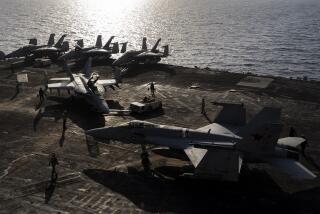Attack on Cole Exposes Our Vulnerability to Terrorism
- Share via
The explosion that blew a 20-by-40-foot hole in the port side of the U.S. guided missile destroyer Cole, killing numerous seamen and threatening to sink the vessel, serves as a stark reminder of the vulnerability of U.S. forces overseas to covert attack. The Cole explosion brings up echoes of Beirut and Dharan, where U.S. service personnel were casualties of small groups of fanatics.
Since then, the U.S. government has expended a large amount of resources on increasing protection for its overseas facilities against sabotage and attacks by terrorists. The question is whether these efforts have proceeded efficiently and quickly enough to keep pace with the adaptability and motivation of those sub-national enemies of the United States willing to express their discontent by attacking symbols of U.S. power abroad. The fact that U.S. officials immediately attributed the explosion to terrorists and deployed the FBI to Yemen displays the Clinton administration’s recognition of this vulnerability.
Such vulnerability could have wider ramifications than the tragic loss of American sailors. What if instead of the Cole, the attacked ship had been a nuclear-powered vessel? Although the chances of a nuclear explosion as the result of a bomb attack are negligible, severe damage to the reactor core and subsequent meltdown could conceivably emit dangerous levels of radiation. This would contaminate the surrounding environment and magnify the effects of an attack by inducing far-reaching psychological and political effects. How many countries, for instance, would feel comfortable knowing that U.S. ships frequenting their ports could become irradiators of their coastal areas?
The current conflagration in Israel has led to demonstrations throughout the region in the past week, including a rise in anti-U.S. sentiment within the Arab world. Reports question why the Cole was not using its own support boats in the Middle East port of a country with a reputation for violence. Shouldn’t there have been increased alert levels among the U.S. military, especially deployments in the Persian Gulf region, to the possibility of terrorist attacks?
Obviously, even if such precautions were being taken at the time of the alleged attack, they proved insufficient. An attack by a suicide bomber is often impossible to prevent. But, in this case--dealing with an identifiable target in a tense political climate--surely there were added steps that could have been taken regarding the approach of a foreign vessel that might have prevented the tragic loss of American lives.
The incident raises questions about the integrity of current Department of Defense force-protection measures. While the Cole and other billion-dollar vessels like it may be able to thwart conventional military attacks using the most advanced sensor systems and countermeasures (the Cole possesses plenty of both), it would be shameful indeed for the U.S. Navy if its vessels proved vulnerable to an inflatable dinghy filled with explosives.
More to Read
Sign up for Essential California
The most important California stories and recommendations in your inbox every morning.
You may occasionally receive promotional content from the Los Angeles Times.













